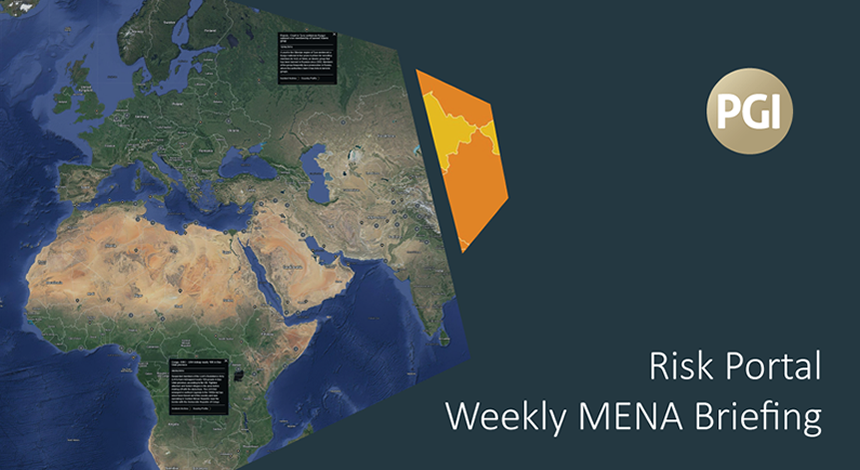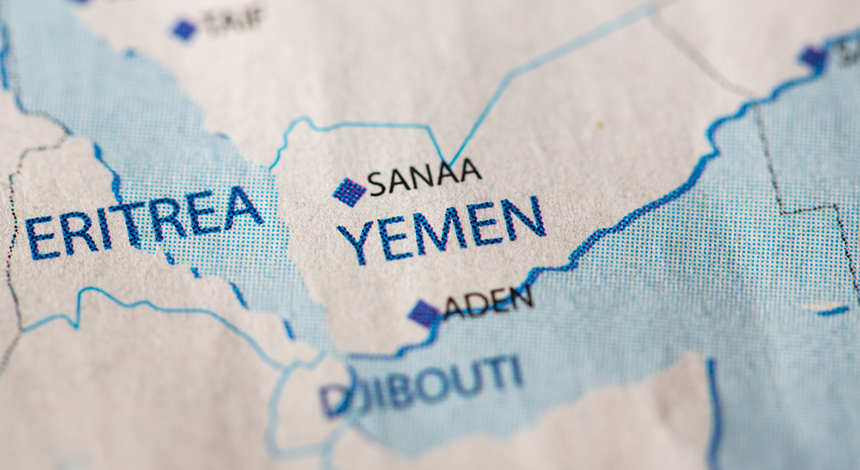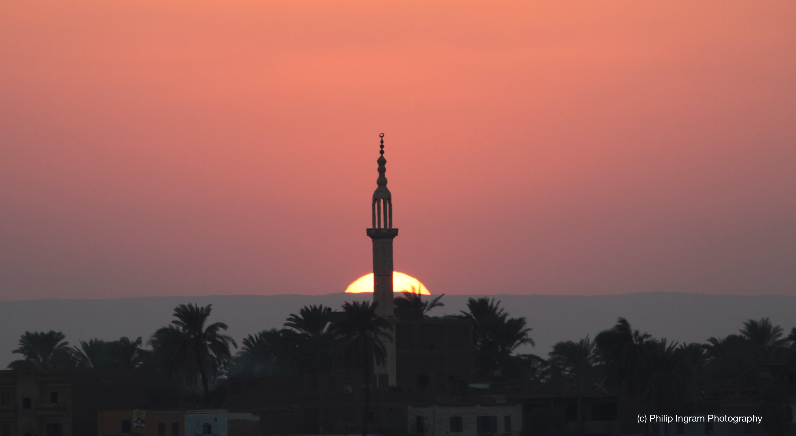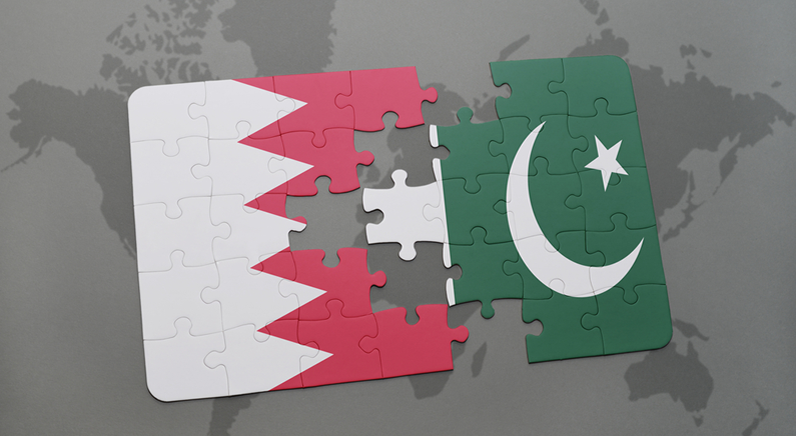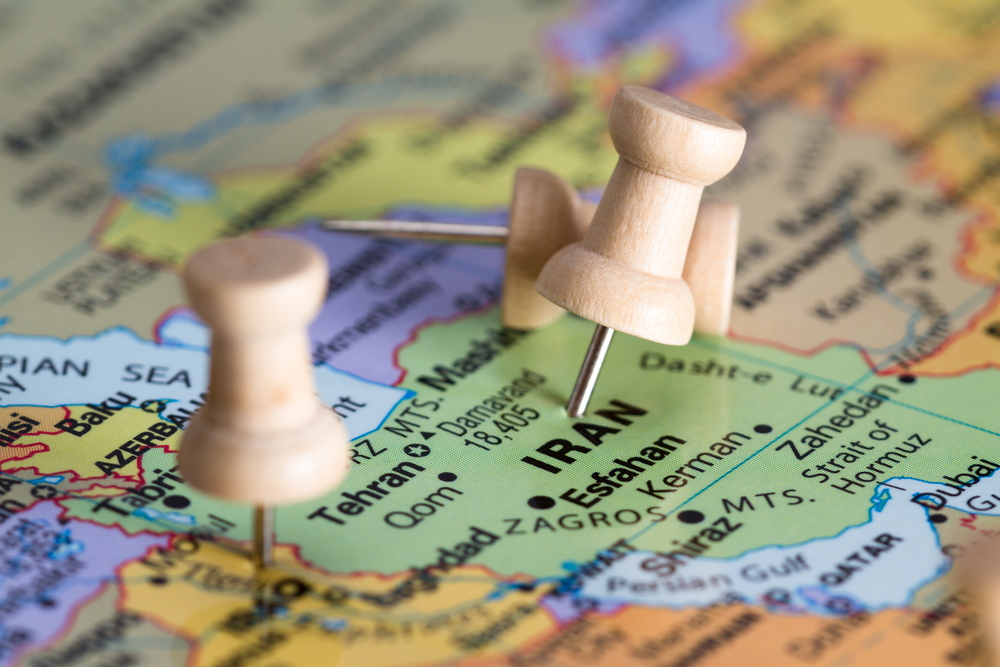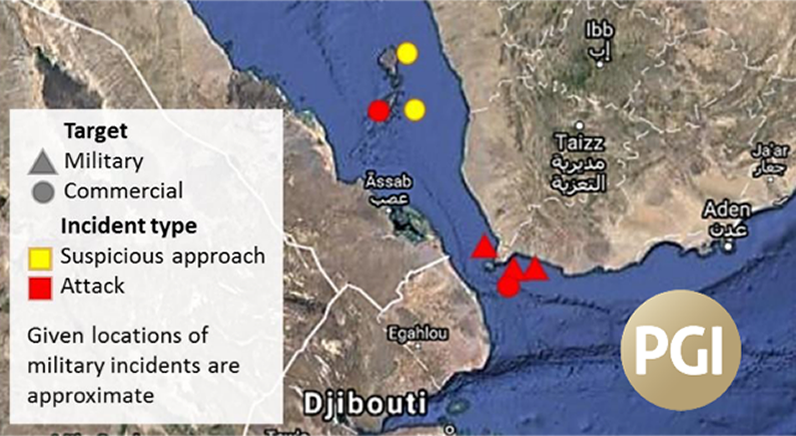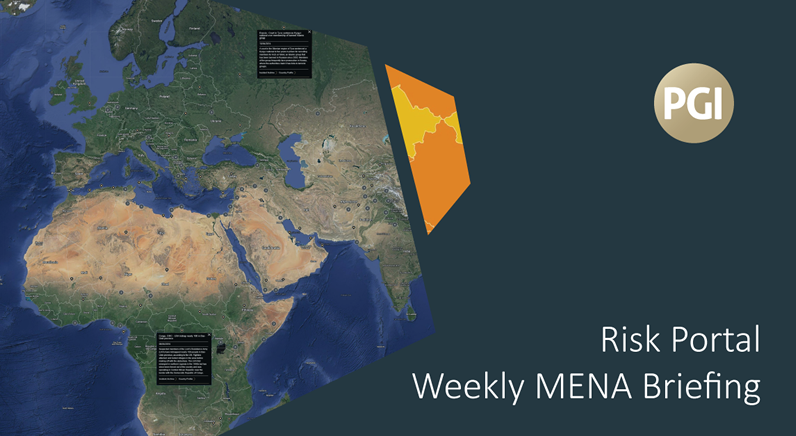Syrian crisis continues reports Protection Group International (PGI)
The spillover of violence from the conflict in Syria continued, with Israeli forces launching a cross-border raid against Islamic State militants in Syrian territory on 27 November. This was followed on 30 November by Israeli air strikes west of Damascus, reportedly to prevent the transfer of weapons to Hezbollah.
The strikes come as pro-regime forces in Aleppo continued their advance and made significant territorial gains against rebels in the east of the divided city. Conditions in Yemen continue to worsen and the formation of a new Houthi-led government in Sana’a will only further damage already remote prospects for a resolution to the 20-month conflict.
PGI’s Weekly Middle East and North Africa (MENA) Briefing provides an overview of key developments from across the region in the past seven days.

Algeria
Troops arrest two militants in Timiaouine – 29 November
Two militants were arrested by the security forces after a clash in southern Timiaouine, Bordj Badji Mokhtar, Adrar province. The reports indicated the two militants were wounded in the ambush. Troops recovered weapons and ammunition following the skirmish.
Police break up protest in Algiers – 27 November
Security forces dispersed a protest led by trade unions in Algiers against proposed reforms that would end early retirement. Several protesters were arrested amid reports of clashes between demonstrators and security forces near the parliament building. Activists claimed that a number of protesters had been prevented from attending the gathering after they were stopped at checkpoints outside Algiers.
Egypt
Assailants attack Coptic village in Sohag – 26 November
Unknown assailants attacked the Coptic Christian village of Al-Naghmeish in Sohag governorate. According to a local priest, violence in the area saw 2,000 people take part in attacks on the local Coptic community in response to a dispute over the location prayer services, though these claims were not verified independently. Four people were injured and 15 homes were damaged in the unrest. Security forces reportedly used to tear gas to disperse crowds and 18 militants were arrested.
Islamic State claims checkpoint car bomb attack – 25 November
Islamic State claimed responsibility for an attack on a military checkpoint in North Sinai that killed 12 soldiers near al-Arish in North Sinai. It had earlier been reported that eight people were killed but military representatives confirmed that four other bodies had been found when inspecting the scene of the attack. Islamic State is affiliated with several local militant groups in Sinai and has conducted multiple attacks on security personnel.

Iran
US says IRGC vessel aims weapon at helicopter – 26 November
The US Navy said that an Iranian Islamic Revolutionary Guard vessel pointed its weapon at a US SH-60 helicopter in international waters in the Strait of Hormuz. The incident occurred when the US Navy helicopter flew within 0.8 km of two Iranian warships. US officials said that the action was unsafe but that the crew did not feel threatened. Iran has been accused of aggressive action in international waters against both military and commercial vessels.

Iraq
Red Cross claims battle for Mosul could last months – 2 December
The International Committee of the Red Cross has told Reuters that the Iraqi government’s siege of Islamic State (IS)-held Mosul could take months. The comments come after tens of people were killed by IS car bombs east of Mosul on 1 December, with the Red Cross also reporting that IS snipers are killing civilians trying to flee the city. Mosul is the last major urban stronghold for IS in Iraq, and the Iraqi military estimates there to be 5,000-6,000 IS fighters in the city.
Troops advance in Mosul as fighting damages water pipe – 29 November
Iraqi special forces, backed by Apache helicopters, gained control over the al-Zuhur district of Mosul, which lies less than five km from the Tigris River that divides the city. Officials said government forces, who now hold 23 small and large neighbourhoods largely in eastern Mosul, would control the southern bank within days. Authorities also said fighting had damaged a water pipeline, affecting around 650,000 people in the city. A local councilman said Islamic State militants had attacked water trucks and that basic services in Mosul were non-existent.
Hundreds protest in Baghdad over unpaid bills – 29 November
Hundreds of Iraqi contractors rallied outside the finance ministry in Baghdad to protest unpaid debts owed by the government. The protesters, who came from across the country, said the government had failed to uphold contracts for infrastructure projects over the past two years. The Iraqi Contractors’ Federation estimated that the government owes its members USD 12 bn.
Islamic State militants target Samarra – 28 November
Five suspected Islamic State gunmen, some wearing suicide vests, attacked Samarra, which lies 110 km north of Baghdad and is the site of an important Shi’a shrine. The assailants, as well as four members of the security forces, were killed in the attack. Officials enacted a curfew after the IS militants crossed from the western bank of the Tigris river by boat and attacked a provincial building.

Israel
Cyber-attacks target television news stations – 29 November
Two Israeli television news programs were briefly hacked, resulting in the display of images of Muslim sites for around 30 seconds on privately owned Channels 2 and 10. During the incident, a message that seemed to refer to divine retribution was also shown. The cyber-attack came one day before Israeli lawmakers were due to vote on a bill that would ban the use of loudspeakers at mosques. It was unclear who was responsible for targeting the media outlets.
Wildfires force tens of thousands to evacuate Haifa as PM blames arsonists –25 November
Massive forest fires burned for the fourth straight day in multiple locations across Israel, forcing tens of thousands of people to flee central neighbourhoods of Haifa, the country’s third-largest city. Hundreds of homes were damaged and tens of people hospitalised for respiratory complications from the smoke. Prime Minister Benjamin Netanyahu has blamed the fires on arsonists, who he called terrorists. Fires are also burning west of Jerusalem and in parts of the West Bank, according to national police. There were reports of Palestinians celebrating the wildfires on social media using the hashtag #Israelisburning, indicating possible confirmation of the arson claims. Greece, Cyprus, Turkey and Russia, as well as the Palestinian Authority, have offered to help with the firefighting efforts.

Jordan
Hundreds protest over wages in Amman – 27 November
Around 300 employees from the Jordan Abyad Fertilizers & Chemicals Company (JAFCCO) protested outside the labour ministry, their fifth protest against the company. The workers claimed their employer had not paid their salaries for three months and had failed to provide health insurance. Labour officials said the company was suffering from serious financial problems.
Agents seize 4 mn captagon pills near Saudi border – 27 November
Security forces at a checkpoint near the Durra Border Crossing outside Aqaba seized 4 mn captagon pills from a vehicle with a foreign licence plate. The shipment was destined for an unnamed country and the drugs were sourced from Jordan. The driver was arrested after the narcotics tablets were found in the car’s tyres and other compartments.

Kuwait
Iranians confess to murder – 25 November
The interior ministry said that two Iranian nationals confessed to the murder of a Kuwaiti sheikh. The gunmen shot dead the sheikh, another Kuwaiti national and an Indonesian woman in Salwa, around 13 km south of Kuwait City. An Indian man was shot by the gunmen but he survived and informed authorities. The suspects fled after stealing three guns and USD 905,000. One of the assailants worked as a cook for the sheik.

Lebanon
Gunmen kill police officer in Beirut – 1 December
Lebanon’s National News Agency reported that a police officer had been shot dead by unknown gunmen in the southern Beirut area of Choueifat. The officer was reportedly shot at close range as he manned a checkpoint.

Libya
Armed groups clash in Tripoli – 1 December
Various armed groups engaged in heavy clashes in Tripoli throughout 1 December, with local eyewitnesses claiming the fighting was heavier than usual and tanks and armed convoys could be seen in some areas of the city. It is unclear what has caused the increase in violence. Fighting was particularly heavy in the Rixos, Bab Benghashir and Abu Salim neighbourhoods, as well as Habda district. Tripoli is controlled by a number of different armed groups, including several aligned to the UN-backed government which arrived in March.
Tobruk protesters target UN envoy – 29 November
Demonstrators gathered outside Tobruk airport to protest a visit by UN Libya envoy Martin Kobler, who was meeting with local officials inside the airport building. The protesters said the UN was responsible for instability in Libya. It was unclear if the protest prevented Kobler from travelling into Tobruk, though in March 2015, Kobler’s predecessor Bernardino Leon was unable to leave the same airport due to a protest.
US says French air strike likely killed Belmokhtar – 28 November
The Wall Street Journal, citing unnamed US officials, said that a French air strike in southern Libya likely killed Mokhtar Belmokhtar, a veteran Algerian jihadist leader responsible for the January 2013 In Amenas attack. US officials provided some of the intelligence that led to the strike, which took place earlier in November. Specific details about the time and location of the operation were not provided. Belmokhtar has previously been falsely reported killed in earlier US strikes.
LNA bombs checkpoint in Kufra – 28 November
The Libya Herald reported aircraft from the Libyan National Army (LNA), which is led by eastern general Khalifa Haftar, bombed the Tebu-held Kilinja checkpoint in Kufra district. The incident comes after LNA forces struck a Tebu position in Kufra, near Rebyana, on 31 October. Both attacks did not cause any casualties. The attacks, which reports indicated may have been carried out by UAE aircraft based in Libya, signal LNA’s push against their previous Tebu allies.
Libya Dawn figure released from captivity – 26 November
Jamal Zubia, the top Libya Dawn media figure, was freed in Tripoli after being held since August. Zubia and an assistant who was abducted alongside him were both freed in unknown circumstances. Financially and politically motivated kidnappings occur frequently across Libya.

Syria
Clashes, air strikes continue in Aleppo – 1 December
There were reports of continued fighting and bombardment of opposition-held eastern Aleppo. The clashes centred on the Masarania and Sheikh Saed areas. Rebels shelled the government-held areas of Bustan, Zahra and Meridian while pro-regime forces attacked Ansari, Jasmati, and Salah al-Din. The stepped-up government assault on Aleppo launched in November has seen regime forces make significant gains, prompting dire warnings from UN officials of a humanitarian crisis.
Damascus confirms Israeli air strikes – 30 November
Syria confirmed reports that Israeli warplanes struck locations west of Damascus at around 0120 hrs local time, though state media said there were no casualties. Press reports said the air strikes destroyed a convoy carrying weapons intended for Hezbollah near the town of As’saboura on the Damascus-Beirut Highway west of the capital. There were also reports that warplanes struck a weapons cache belonging to the Syrian Army’s Fourth Battalion. In the past, Israel has refused to confirm or deny military operations in Syria.
Two Turkish soldiers missing in Aleppo province – 29 November
Turkey confirmed that it had lost contact with two of its soldiers in northern Syria. The Syrian Observatory for Human Rights said the men disappeared in the Aldana area west of Islamic State (IS) held al Bab in Aleppo province. IS claimed to have captured the men but this could not be verified.
Israeli military kills four alleged IS affiliates in Golan Heights – 27 November
Israeli military sources claimed to have killed four Islamic State affiliated militants in the Golan Heights area after soldiers came under fire. Fighters from the IS affiliated Shuhada al-Yarmouk reportedly used machine guns and mortar fire, prompting the Israeli military to respond with an air strike against the vehicle in which the militants were travelling.

Tunisia
Police arrest two for attack on tourist in Hammamet – 30 November
Security forces in Hammamet, Nabeul governorate, arrested two youths who allegedly attempted to rob a Canadian tourist of her handbag while on a motorbike. The victim fell and broke her pelvis as a result of the attack.
Protesters block road in Ben Guerdane – 29 November
Local traders and civil society activists began an indefinite blockade of the road linking Ben Guerdane and Ras Jedir to the locality of Zokra to protest Libyan officials. The protesters said the demonstration was necessary to call attention to mistreatment by Libyan authorities at the Ras Jedir border crossing and to demand officials in Libya cancel a customs tax after Tunisia revoked a similar levy.
Security services break up militant cells in Gafsa, Belkhir – 27 November
Local media reported security forces had broken up three terrorist cells that worked to send youths to conflict zones abroad, including Syria. One of the cells comprised four members and was based in Belkhir, while another had six members and was based out of Gafsa. The cells had contacts with militants in Tunisia and abroad.

United Arab Emirates
Court jails two for membership of Islamist group – 14 November
The State Security Circuit of the Supreme Federal Court jailed one man for ten years and another for seven years for membership of the al-Islah Islamist organisation, linked to the banned Muslim Brotherhood. The prosecution said that one of the men had planned to overthrow the government. The government occasionally carries out crackdowns on Islamists, particularly following the 2011 Arab Uprisings.

Yemen
UN, President Hadi criticise Houthi-led government plan – 30 November
Ismail Ould Cheikh Ahmed, the UN envoy for Yemen, criticised Houthi rebels over their decision to form a government with allies of former President Ali Abdullah Saleh. The diplomat said the move to set up a new administration in areas under Houthi control was a blow to peace efforts. President Abdrabbuh Mansour Hadi, head of the recognised government based in Aden, also said the latest move by Houthi forces and their allies would undermine peace efforts.
Clashes kill 40 Houthi forces in Midi – 30 November
Local media reported 40 pro-Houthi fighters had been killed and 27 injured in intense fighting and shelling in Midi, Hajjah governorate. Causality figures for pro-government forces were not provided. Saudi-led coalition air strikes, which have intensified in the area in recent days, destroyed Houthi rockets, vehicles and weapons stores in the latest round of strikes.
Heavy fighting continues in Sa’dah
Pro-government forces said around 20 Houthi rebels were killed and tens of others arrested in heavy clashes as part of an offensive in Sa’dah province. Causalities among pro-government forces were not provided, though they claimed to have captured strategic locations from their Houthi rivals. Clashes were also reported in Taiz and in Nihm district near Sana’a, while air strikes by Saudi-led forces targeted pro-Houthi positons in al-Jawf, Marib and Hajjah.
To receive PGI’s daily briefing, containing a comprehensive update of developments in the region, register now for free Risk Portal access or follow us @PGIIntelligence
[su_button url=”https://riskportal.pgitl.com/register” target=”blank” background=”#B6A175″ color=”#ffffff” size=”10″ radius=”0″ icon=”icon: arrow-circle-right”]Click here to register for access to the free PGI Risk Portal[/su_button]



















